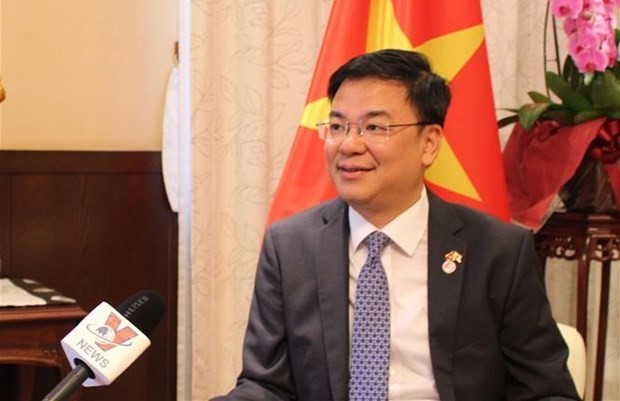 |
Vietnamese Ambassador to Japan Pham Quang Hieu (Photo: VNA) |
Vietnam is among the eight countries that have been invited by Japan, which is holding the rotating presidency of the G7 major powers, to the event.
Notably, Vietnam is one of the two Southeast Asian guest nations, apart from Indonesia – ASEAN Chair 2023, the diplomat told the Vietnam News Agency (VNA). This is the third time Vietnamese leaders have attended the summit, following their attendance in 2016 in Japan and in 2018 in Canada, and the second time Vietnam has been invited as a single nation, not in its capacity as a representative of an organisation or a group of countries in the region.
Hieu stressed that the invitation reflects the international community’s appreciation of Vietnam’s active and proactive international integration, as well as its efforts and constructive, responsible contributions to common international issues such as sustainable development, climate change response, food security and energy security.
The fact that Japan once again invited the Vietnamese Prime Minister to attend the summit also mirrors the thriving Extensive Strategic Partnership for Peace and Prosperity in Asia between the two countries, he continued. It also reflects the importance Japan attaches to Vietnam’s role and position in the region, as well as Japan’s hope for further coordination and support from Vietnam at multilateral forums, and the Southeast Asian nation’s contributions to settling common international and regional issues.
Hieu noted that all member countries of G7 and expanded G7 place importance to cooperative ties with Vietnam, and wish to boost mutually beneficial multi-faceted collaboration with the nation, thus promoting their influence in Southeast Asia in particular and Asia-Pacific in general.
Prior the announcement of the invitation, Japanese PM Fumio Kishida announced over US$75 billion infrastructure assistance for Indo-Pacific, he said, adding that the PM considers the summit an opportunity to discuss cooperation with developing and emerging nations, along with development assistance and how to cope with challenges, and ensure food security and environmental security globally. G7 nations have agreed to include Vietnam into the list of priority countries in energy cooperation.
Therefore, the summit is an opportunity for Vietnam to approach the investment and enhance collaboration with the G7 nations in economic model transformation and post Covid-19 economic recovery, he said. According to the ambassador, the major contents of the G7 Summit and the expanded G7 Summit match Vietnam’s interests.
The summit will be a chance for Vietnam to introduce its foreign policy, promote its image, call for support and attract foreign investments, while displaying its sense of responsibility in contributing to handling common regional and international issues, he went on.
Asked about the Vietnam-Japan relations, the ambassador said Japan’s two invitations come from the thriving bilateral extensive strategic partnership, for the sake of the two peoples, and for peace and prosperity in Asia and the world.
PM Pham Minh Chinh’s upcoming trip to Japan demonstrates Vietnam’s consistent policy in its relations with Japan, as well as the importance and priority Vietnam gives to enhancing the extensive strategic partnership, for prosperity and development in Asia.
It will be an opportunity to further promote specific measures in order to connect the two economies through cooperation in investment, trade and ODA, and step up collaboration in all spheres, the diplomat said. He described the trip as a demonstration of political trust between the two countries, and Vietnam’s responsibility in addressing global challenges, adding it will give more momentum to the Vietnam-Japan relationship. Hieu emphasised that since the two countries established diplomatic ties in 1973, the bilateral relationship has been developing constantly in various areas, from politics to economy, culture and sports, and at all levels.
He said that there is “limitless potential” for the Vietnam-Japan relations, and the celebrations of the bilateral diplomatic ties this year will offer an opportunity to look back on the relationship, and create a foundation for it to grow more outstandingly towards the future, reaching the regional and global levels.
























